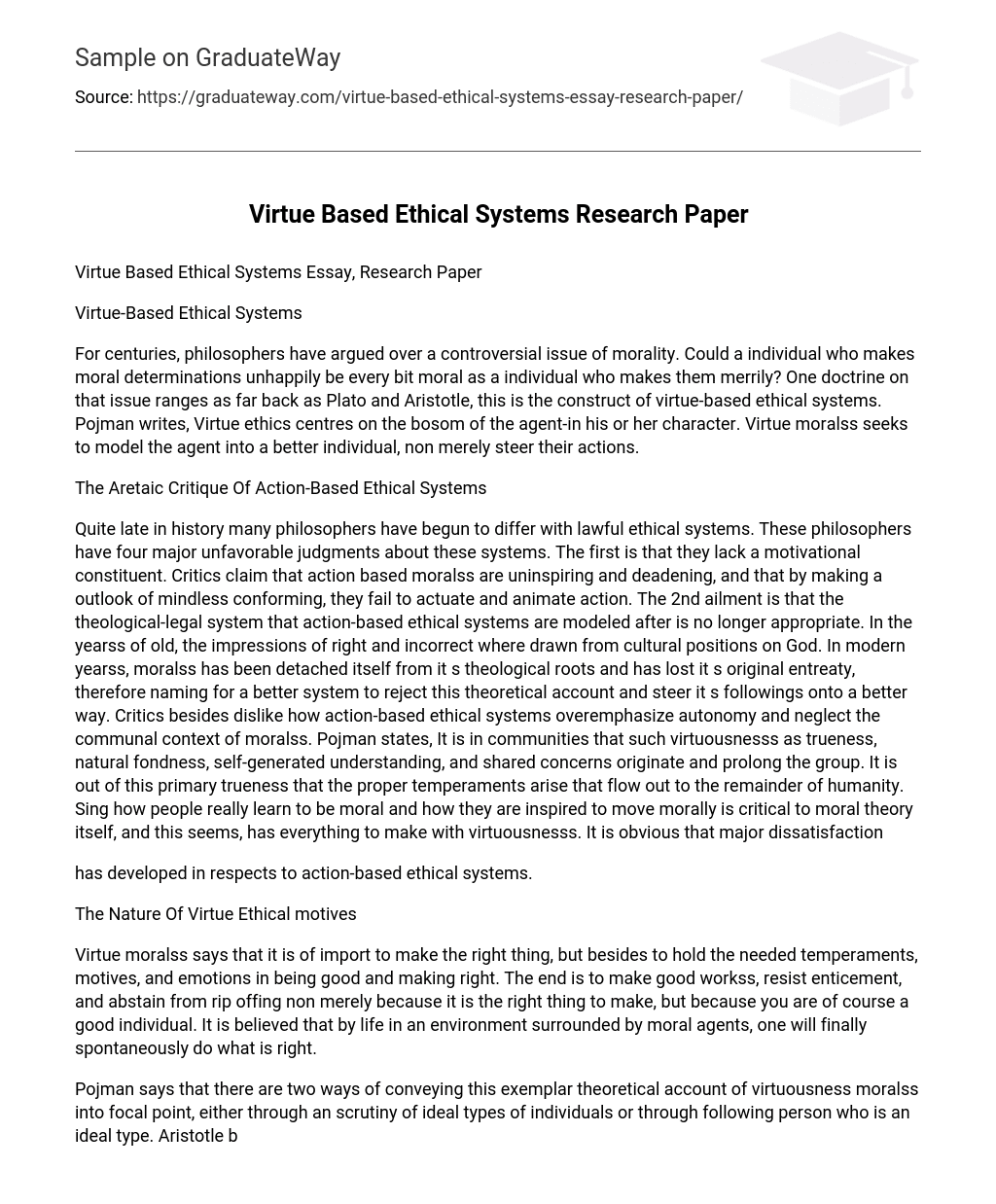Introduction
For centuries, philosophers have argued over a controversial issue of morality. Could a individual who makes moral determinations unhappily be every bit moral as a individual who makes them merrily? One doctrine on that issue ranges as far back as Plato and Aristotle, this is the construct of virtue-based ethical systems. Pojman writes, Virtue ethics centres on the bosom of the agent-in his or her character. Virtue moralss seeks to model the agent into a better individual, non merely steer their actions.
The Aretaic Critique Of Action-Based Ethical Systems
Quite late in history many philosophers have begun to differ with lawful ethical systems. These philosophers have four major unfavorable judgments about these systems. The first is that they lack a motivational constituent. Critics claim that action based moralss are uninspiring and deadening, and that by making a outlook of mindless conforming, they fail to actuate and animate action. The 2nd ailment is that the theological-legal system that action-based ethical systems are modeled after is no longer appropriate.
In the yearss of old, the impressions of right and incorrect where drawn from cultural positions on God. In modern yearss, moralss has been detached itself from it s theological roots and has lost it s original entreaty, therefore naming for a better system to reject this theoretical account and steer it s followings onto a better way. Critics besides dislike how action-based ethical systems overemphasize autonomy and neglect the communal context of moralss.
Pojman states, It is in communities that such virtuousnesss as trueness, natural fondness, self-generated understanding, and shared concerns originate and prolong the group. It is out of this primary trueness that the proper temperaments arise that flow out to the remainder of humanity. Sing how people really learn to be moral and how they are inspired to move morally is critical to moral theory itself, and this seems, has everything to make with virtuousnesss. It is obvious that major dissatisfaction has developed in respects to action-based ethical systems.
The Nature Of Virtue Ethical motives
Virtue moralss says that it is of import to make the right thing, but besides to hold the needed temperaments, motives, and emotions in being good and making right. The end is to make good workss, resist enticement, and abstain from rip offing non merely because it is the right thing to make, but because you are of course a good individual. It is believed that by life in an environment surrounded by moral agents, one will finally spontaneously do what is right.
Pojman says that there are two ways of conveying this exemplar theoretical account of virtuousness moralss into focal point, either through an scrutiny of ideal types of individuals or through following person who is an ideal type. Aristotle believed that virtuousnesss are merely those features that enable persons to populate good among others. He thought that by populating good among our equals, we develop the right wonts. And it is these wonts as virtuousnesss that will take us to a happy life. He besides believed that all people did non hold the same ability to be virtuous, Some are endowed with great ability, but others lack it wholly. Some people are worthless natural slaves.
It is a fact that most of us learn by watching others and emulating them, this is the bosom of virtuousness moralss. Peoples like Jesus, Ghandi, and Mother Theresa are illustrations of first-class people who have lived moral lives. These lives set the illustration and animate us to populate lives similar to theirs, amidst the belief that these persons seemed dull-witted and humourlessly bland or that they where unable to bask the enjoyable in life.
But Pojman sees nil bland or tiring about the lives these people lived. He has a deep grasp for their ability to give without terminal, and to happen a higher manner of life. For where would this universe be without such outstandingly beautiful people? It is through these persons that we can happen that a higher manner of life is available to us all, but it is up to us to travel in its way.





